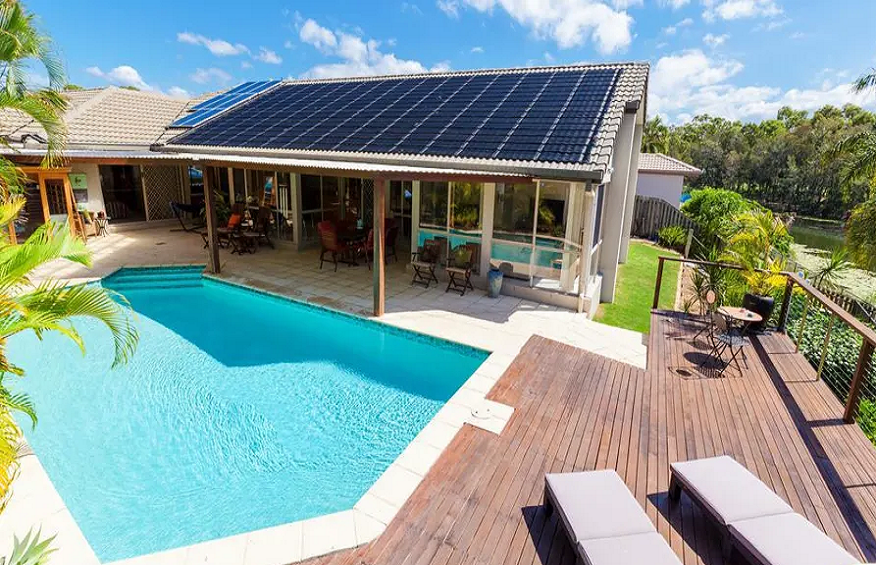The Impact of Solar Panels on Your Home’s Value
In recent years, the adoption of renewable energy sources has gained significant momentum, with solar power leading the way. Homeowners across the globe are increasingly turning to solar panels to reduce their carbon footprint, save on energy costs, and promote sustainability. Beyond the environmental benefits, installing solar panels on your home can also have a positive impact on its market value. This article delves into the various ways solar panels can influence your home’s value and offers valuable insights for homeowners considering this green investment.

Increased Property Value:
Installing solar panels can significantly boost your home’s value. Several studies have demonstrated a clear correlation between solar panel installations and increased property prices. Research conducted by the National Renewable Energy Laboratory (NREL) in the United States found that homebuyers were willing to pay a premium of up to $4 per watt for homes equipped with solar panels. Moreover, a study conducted by the Lawrence Berkeley National Laboratory revealed that solar homes tend to sell faster than non-solar homes, further highlighting the appeal of solar technology among potential buyers.
Energy Cost Savings:
One of the most attractive benefits of solar panels is the potential for substantial energy cost savings. By generating your own clean and renewable electricity, you can significantly reduce or even eliminate your dependence on traditional energy sources. This translates into lower energy bills over the long term, which is a major selling point for potential homebuyers. The prospect of reduced monthly expenses can make your home more appealing and thus increase its overall value.
Positive Environmental Impact:
The growing concern for environmental sustainability has made solar panels a desirable feature for many homebuyers. Solar power is clean and emits zero greenhouse gases, contributing to a greener future. By installing solar panels, you actively participate in the fight against climate change, reducing your carbon footprint and promoting a cleaner environment. This eco-conscious aspect adds value to your home, particularly for buyers who prioritize sustainable living and energy-efficient homes.
Government Incentives and Tax Benefits:
Governments worldwide are actively encouraging homeowners to adopt solar energy by offering various incentives and tax benefits. These incentives can include grants, tax credits, rebates, and favourable financing options. Taking advantage of such programs not only makes solar panel installations more affordable but also enhances the overall return on investment. These financial incentives can positively impact your home’s value by reducing the net cost of the installation and making it an attractive proposition for potential buyers.
Marketing Advantage:
A home equipped with solar panels stands out in a competitive real estate market. When listing your home for sale, highlighting the presence of solar panels can differentiate your property from others and attract a niche market of environmentally conscious buyers. Solar panels are often viewed as a valuable asset that adds to the overall appeal and desirability of a property, setting it apart in terms of energy efficiency and sustainability.
Solar panels offer numerous advantages to homeowners, ranging from cost savings to environmental benefits. As highlighted in this article, the impact of solar panels on your home’s value is significant and multifaceted. By increasing property value, reducing energy costs, promoting sustainability, and leveraging government incentives, solar panels have the potential to enhance both the financial and environmental aspects of homeownership. If you are considering investing in solar panels, remember that it’s essential to choose reputable installers and ensure the system is properly designed and maintained. Ultimately, solar panels not only contribute to a brighter future but also add long-term value to your home.
What are solar panels?
Solar panels, also known as photovoltaic (PV) panels, are devices that harness the energy from sunlight and convert it into electricity. They are composed of multiple solar cells made of semiconductor materials, typically silicon, which generate an electric current when exposed to sunlight. Solar panels come in various sizes and configurations, ranging from small portable panels to large installations on rooftops or in solar farms. These panels are designed to capture solar energy efficiently and provide a clean and renewable source of electricity for residential, commercial, and industrial applications.
How do solar panels work?
Solar panels work through a process called the photovoltaic effect. When sunlight hits the solar panels, the photons (light particles) transfer their energy to the electrons in the semiconductor material, freeing them from their atomic bonds. This creates a flow of electrons, generating a direct current (DC) of electricity. The DC electricity produced by the solar panels is then converted into alternating current (AC) using an inverter, which matches the electricity used in homes and businesses. The AC electricity can be used to power appliances and devices or fed back into the grid for others to use. Solar panels are most effective when they are positioned to receive direct sunlight and are typically installed on rooftops or in areas with optimal solar exposure.
The pros and cons of a solar panel system:
Pros:
- Renewable Energy: Solar panels harness the power of the sun, which is an abundant and renewable energy source. By using solar energy, homeowners reduce their reliance on fossil fuels, contributing to a cleaner and more sustainable future.
- Cost Savings: Solar panels can significantly reduce electricity bills over time. Once installed, the energy they generate is essentially free, allowing homeowners to save on their monthly utility expenses.
- Environmental Benefits: Solar energy is clean and produces no greenhouse gas emissions or air pollution during operation. By using solar panels, individuals can reduce their carbon footprint and mitigate the negative impact on the environment.
Cons:
- Upfront Cost: The initial investment for purchasing and installing solar panels can be relatively high. However, costs have decreased in recent years, and various financing options, incentives, and rebates are available to make solar installations more affordable.
- Weather-Dependent: Solar panels rely on sunlight to generate electricity, so their performance can be affected by weather conditions. Cloudy days or shading from nearby objects can reduce the efficiency of the panels.
- Space Requirements: Solar panels require a sufficient amount of space for installation, especially for larger systems. Not all properties have enough suitable roof or ground space to accommodate an optimal solar panel system.
What is battery storage?
Battery storage, also known as solar battery storage or energy storage systems, allows homeowners to store excess electricity generated by their solar panels for later use. Instead of sending the surplus energy back to the grid, it is stored in batteries, which can be used during times of low solar generation or during power outages. Battery storage systems enable homeowners to maximize self-consumption of solar energy and increase energy independence by reducing reliance on the grid.
Would I benefit from Battery Storage?
The benefits of battery storage depend on individual circumstances and energy usage patterns. Battery storage is particularly beneficial for homeowners who experience frequent power outages or are in areas with unreliable grid infrastructure. It provides a backup power source during emergencies, ensuring a continuous supply of electricity. Additionally, battery storage systems allow for increased self-consumption of solar energy, maximizing the utilization of the energy generated by solar panels and reducing dependency on grid electricity. This can lead to further cost savings and increased energy independence.
What’s the cost of a solar panel system with and without battery storage?
The cost of a solar panel system with or without battery storage can vary depending on several factors, such as the size of the system, quality of components, installation complexity, and local market conditions. Generally, the cost of solar panels has been decreasing over the years, making them more affordable. On average, a typical residential solar panel system in Europe can cost between €5,000 and €15,000, excluding any government incentives or tax credits.
The cost of battery storage varies significantly depending on the capacity (measured in kilowatt-hours, kWh) and the type of battery technology used. As of now, residential battery storage systems in Europe can range from €2,000 to €10,000 or more, depending on the size and brand. It’s important to note that battery storage costs are decreasing, similar to solar panels, as technology advances and becomes more widely adopted.
Unlock the Power of Solar for Your Cooling Needs
Are you on the hunt for the most effective and sustainable air conditioning Marbella has available? Then you need not look any further. Introducing solar-powered air conditioning, a game-changing solution that harnesses the sun’s energy to cool your home while significantly cutting down on your utility bills. With solar panels installed, you’re transforming the intense Marbella sun from a challenge into an asset that works for you.
Solar-powered air conditioning is more than a high-tech luxury; it’s a practical response to Marbella’s sunny weather. How does it work? Simply put, solar panels on your rooftop capture sunlight and convert it into electricity to power your air conditioning system. This process is most effective during the heat of the day, exactly when your air conditioning demand is highest, making it a highly efficient solution that aligns with your cooling needs.
Using solar energy to power your air conditioning not only results in significant cost savings on your energy bill but also reduces your environmental impact. In a world increasingly concerned with sustainability, going solar is a step towards a greener and more eco-friendly lifestyle. If you’re looking for the best Air Conditioning Marbella Spain has to offer, then look no further. Solar-powered air conditioning is the answer, turning the power of the sun into your personal cooling solution. So, are you ready to harness the sun to keep your home cool and comfortable? Embrace the future of air conditioning and make a change that makes sense.


